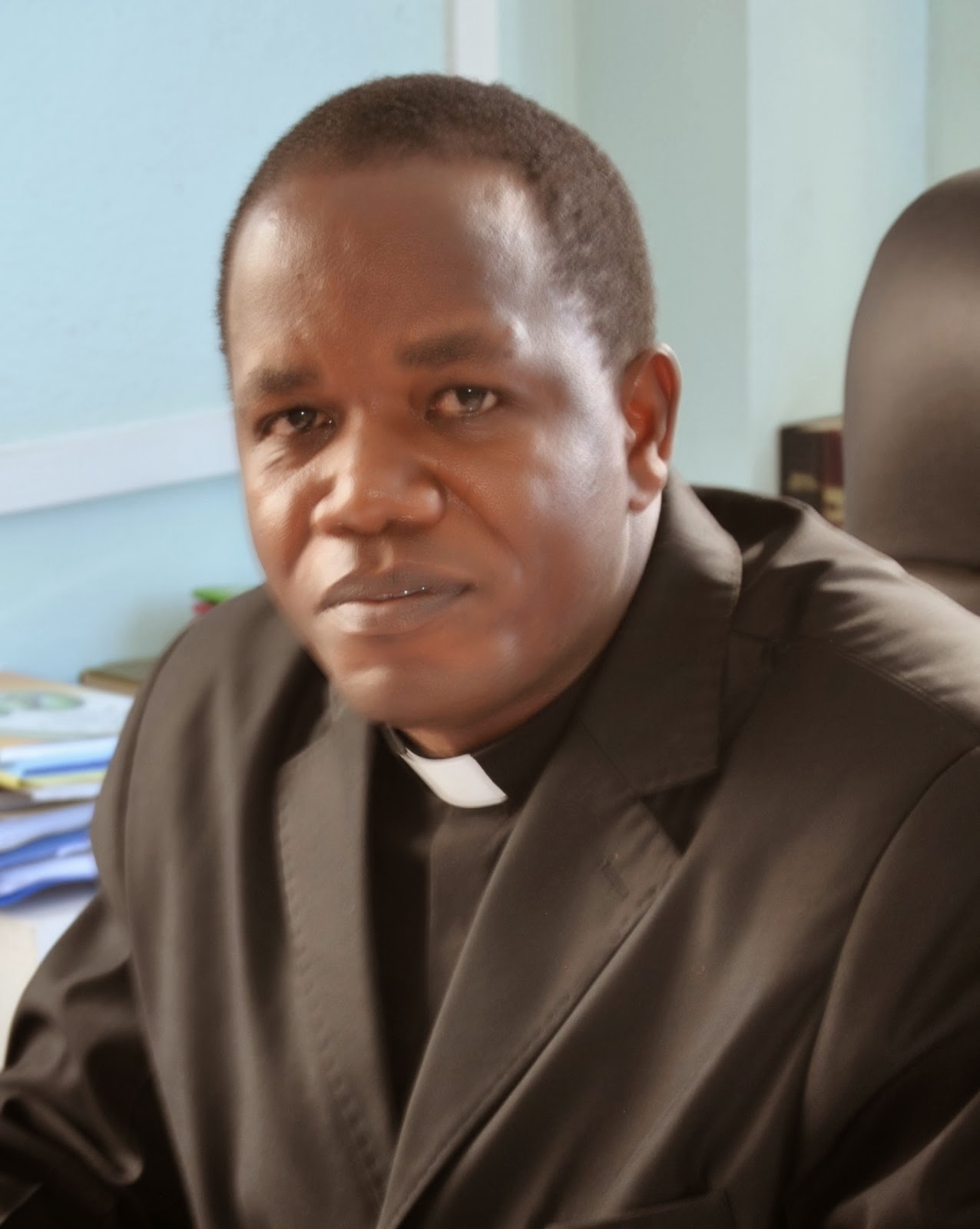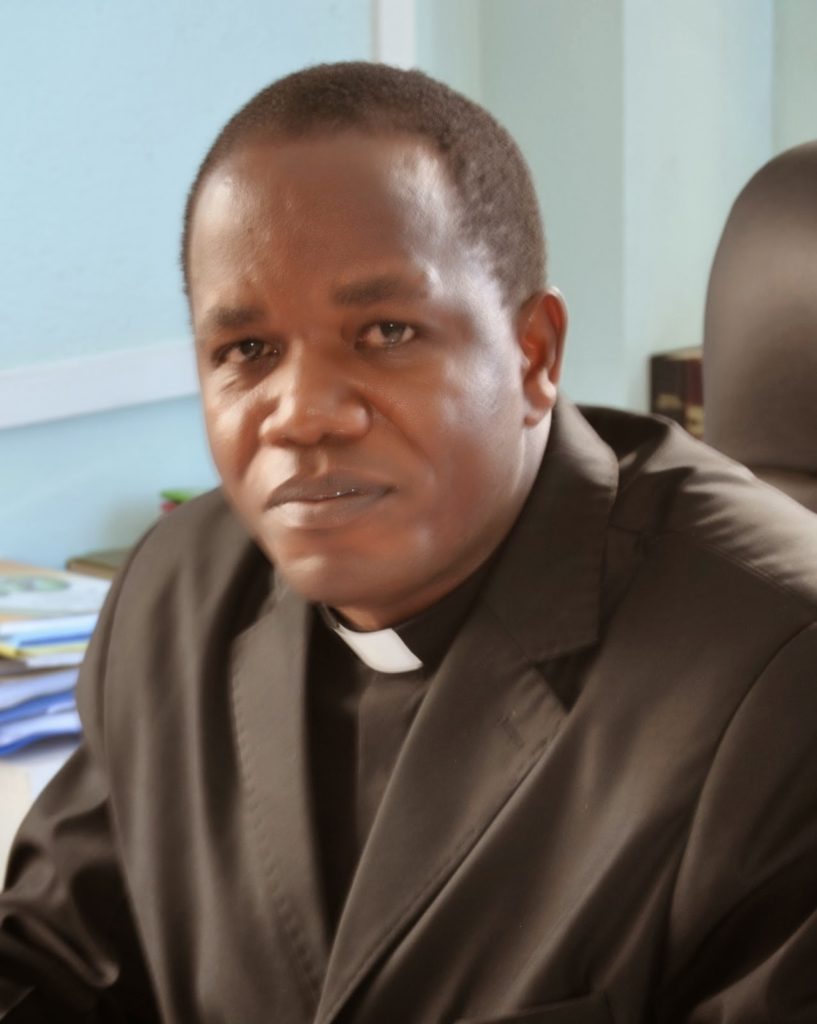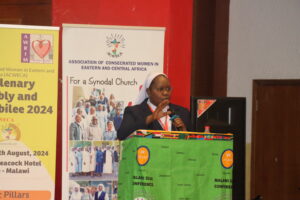AMECEA: South Sudan Needs an Urgent Humanitarian Support

 |
| Fr Ferdinand Lugonzo |
The Association of Member Episcopal Conferences in Eastern
Africa is appealing to the AMECEA conferences, the Regional and International
Communities for urgent humanitarian support to assist the citizens of South Sudan
who are internal displaced because of violence in their country.
Africa is appealing to the AMECEA conferences, the Regional and International
Communities for urgent humanitarian support to assist the citizens of South Sudan
who are internal displaced because of violence in their country.
The call comes a few days after AMECEA delegation came
back from the solidarity visit to Juba, South Sudan that took place on 23 -25
January 2014. The delegation consisted of Most Rev John Baptist Odama,
Archbishop of Gulu Archdiocese (Uganda); Most Rev Berhaneyesus Souraphiel,
Archbishop of Addis Ababa Archdiocese (Ethiopia), Rt Rev Phillip Anyolo, Bishop
of Homa Bay Diocese (Kenya) and Very Rev Fr Ferdinand Lugonzo, AMECEA Secretary
General. During the visit, they delivered the message to the Bishops, and to
the government of South sudan in which they appealed for a cessation of
hostilities.
back from the solidarity visit to Juba, South Sudan that took place on 23 -25
January 2014. The delegation consisted of Most Rev John Baptist Odama,
Archbishop of Gulu Archdiocese (Uganda); Most Rev Berhaneyesus Souraphiel,
Archbishop of Addis Ababa Archdiocese (Ethiopia), Rt Rev Phillip Anyolo, Bishop
of Homa Bay Diocese (Kenya) and Very Rev Fr Ferdinand Lugonzo, AMECEA Secretary
General. During the visit, they delivered the message to the Bishops, and to
the government of South sudan in which they appealed for a cessation of
hostilities.
According to Fr. Ferdinand Lugonzo, the Secretary General
of AMECEA, the experience in one of the camps they visited in Juba was very disheartening. He said that the internally
displaced people (IDP), majority of them being women and children, are living
under very desperate condition in the camps and without access to basic social services.
of AMECEA, the experience in one of the camps they visited in Juba was very disheartening. He said that the internally
displaced people (IDP), majority of them being women and children, are living
under very desperate condition in the camps and without access to basic social services.
Fr. Lugonzo said that many of these people are sleeping
outside because tents are not sufficient; Worse still, there is meager supply
of water and medical services. “In this situation it is the women and children who
suffer most. We need a collective response by all partners to assist them and the
entire community of South Sudan,” he said.
outside because tents are not sufficient; Worse still, there is meager supply
of water and medical services. “In this situation it is the women and children who
suffer most. We need a collective response by all partners to assist them and the
entire community of South Sudan,” he said.
During the visit, the delegation had a chance to meet the Minister
of Cabinet affairs of the Republic of South Sudan, Hon Dr Martin Elia Lomuro,
who received them on behalf of the President, His Excellence Salva Kiir. They
appealed to the government of South Sudan to offer protection of all people, engage in cessation
of hostilities and provide security to some Church premises that is housing large
numbers of internally displaced people.
of Cabinet affairs of the Republic of South Sudan, Hon Dr Martin Elia Lomuro,
who received them on behalf of the President, His Excellence Salva Kiir. They
appealed to the government of South Sudan to offer protection of all people, engage in cessation
of hostilities and provide security to some Church premises that is housing large
numbers of internally displaced people.
According to Fr. Lugonzo, some of the Church premises have been
attacked and priests have been forced run away. He made specific reference to
the Diocese of Malakal, (Upper Nile in the capital of South Sudan), which is
situated in an area that has been affected by the crisis. In this area, the
Apostolic administrator of the Diocese of Malakal, Msgr. RokoTaban Musa, was
forced out of his residence and the Church premises was was subsequently
looted. Fr. Lugonzo said, that from what they got there, the attacks were not related with religious
fundamentalism, but rather tribal, while some of the perpetrators took advantage
of the chaos to loot even Church property.
attacked and priests have been forced run away. He made specific reference to
the Diocese of Malakal, (Upper Nile in the capital of South Sudan), which is
situated in an area that has been affected by the crisis. In this area, the
Apostolic administrator of the Diocese of Malakal, Msgr. RokoTaban Musa, was
forced out of his residence and the Church premises was was subsequently
looted. Fr. Lugonzo said, that from what they got there, the attacks were not related with religious
fundamentalism, but rather tribal, while some of the perpetrators took advantage
of the chaos to loot even Church property.
The Secretary General said that
this situation in South Sudan affects the entire AMECEA family and it is high
time that the Church in AMECEA region think of practical ways of expressing
solidarity with these people who are suffering. First, an appeal for
humanitarian aid must be extended to all AMECEA countries and to all
humanitarian organisations. He, therefore, made an appeal to the Episcopal
Conferences in the AMECEA region to take the issue of South Sudan seriously in
order to help alleviate the situation.
this situation in South Sudan affects the entire AMECEA family and it is high
time that the Church in AMECEA region think of practical ways of expressing
solidarity with these people who are suffering. First, an appeal for
humanitarian aid must be extended to all AMECEA countries and to all
humanitarian organisations. He, therefore, made an appeal to the Episcopal
Conferences in the AMECEA region to take the issue of South Sudan seriously in
order to help alleviate the situation.
Second, as AMECEA, there is need
to urgently strengthen the apostolate to the nomadic communities in South
Sudan. “A large population of the people in this great country are nomadic” he
said adding that “AMECEA should now strategize to find out how this apostolate
to the nomads can be enhanced.”
to urgently strengthen the apostolate to the nomadic communities in South
Sudan. “A large population of the people in this great country are nomadic” he
said adding that “AMECEA should now strategize to find out how this apostolate
to the nomads can be enhanced.”
Third, is to strengthen the office
of Justice and Peace in South Sudan to locally be in the forefront in promoting
dialogue, peaceful co-existence and reconciliation among the rival groups.
of Justice and Peace in South Sudan to locally be in the forefront in promoting
dialogue, peaceful co-existence and reconciliation among the rival groups.
On the issue of people from South
Sudan who have taken refuge in neighboring countries, Fr Lugonzo said that the Bishops
of South Sudan and Sudan made an appeal, through the AMECEA Secretariat, that the
dioceses in which these refugees are should make some plans so that they may
continue receiving pastoral care and services.
Sudan who have taken refuge in neighboring countries, Fr Lugonzo said that the Bishops
of South Sudan and Sudan made an appeal, through the AMECEA Secretariat, that the
dioceses in which these refugees are should make some plans so that they may
continue receiving pastoral care and services.
Speaking to the AMECEA delegates,
the Bishops of South Sudan said the
crisis has become a wakeup call for the Church in South Sudan to play a
prophetic role in its mission while asking the people to participate in the
National building activities. In addition, the bishops reiterated their call for
unconditional cease fire, humanitarian aid and pastoral support in order to
restore peace in South Sudan.
the Bishops of South Sudan said the
crisis has become a wakeup call for the Church in South Sudan to play a
prophetic role in its mission while asking the people to participate in the
National building activities. In addition, the bishops reiterated their call for
unconditional cease fire, humanitarian aid and pastoral support in order to
restore peace in South Sudan.
Meanwhile,
the government of South Sudan released 7 of the 11 detainees that were taken
into custody following the outbreak of clashes on December 15. The four
remained were still in custody in South Sudan, facing trial for attempting to
topple President Salva Kiir.
the government of South Sudan released 7 of the 11 detainees that were taken
into custody following the outbreak of clashes on December 15. The four
remained were still in custody in South Sudan, facing trial for attempting to
topple President Salva Kiir.
The seven who were released on
Wednesday arrived in Kenya under the custody of President of Kenya His
Excellency Uhuru Kenyatta. The seven men appeared in apparent good health
during a press conference at State House, Nairobi on Wednesday this week.
Wednesday arrived in Kenya under the custody of President of Kenya His
Excellency Uhuru Kenyatta. The seven men appeared in apparent good health
during a press conference at State House, Nairobi on Wednesday this week.
While receiving them, President
Kenyatta called on the parties to respect the signed ceasefire. “Let all
sides in the conflict silence their guns let those in the camps return
home”, he said.
Kenyatta called on the parties to respect the signed ceasefire. “Let all
sides in the conflict silence their guns let those in the camps return
home”, he said.
The release of all the prisoners
has been a key demand of the rebels.
has been a key demand of the rebels.
SOURCE:
AMECEA Social Communications
AMECEA Social Communications


